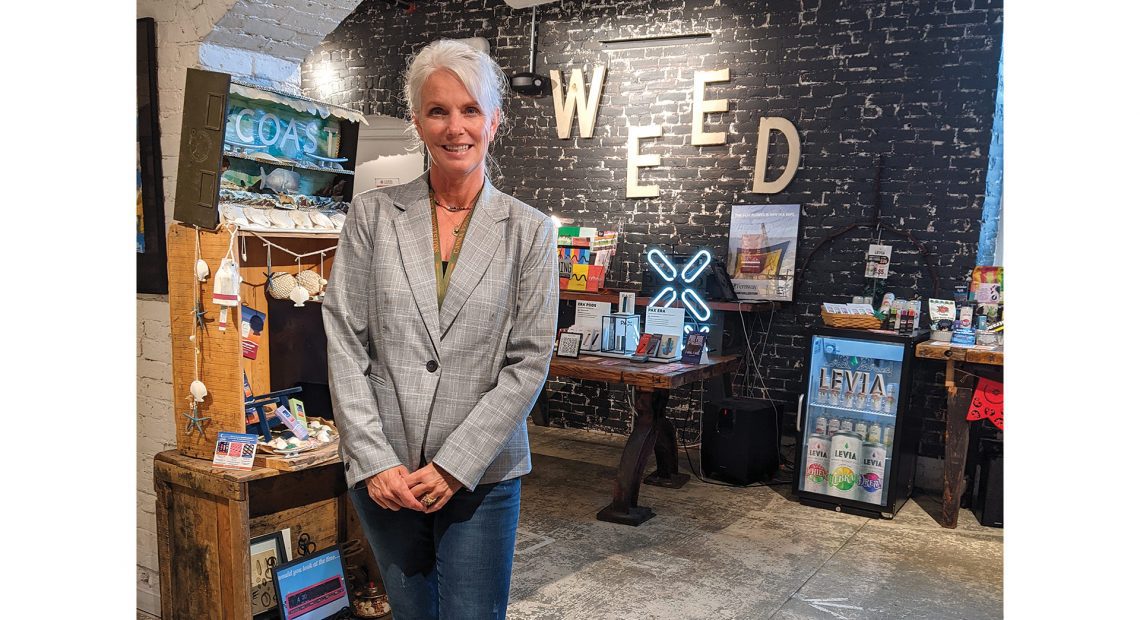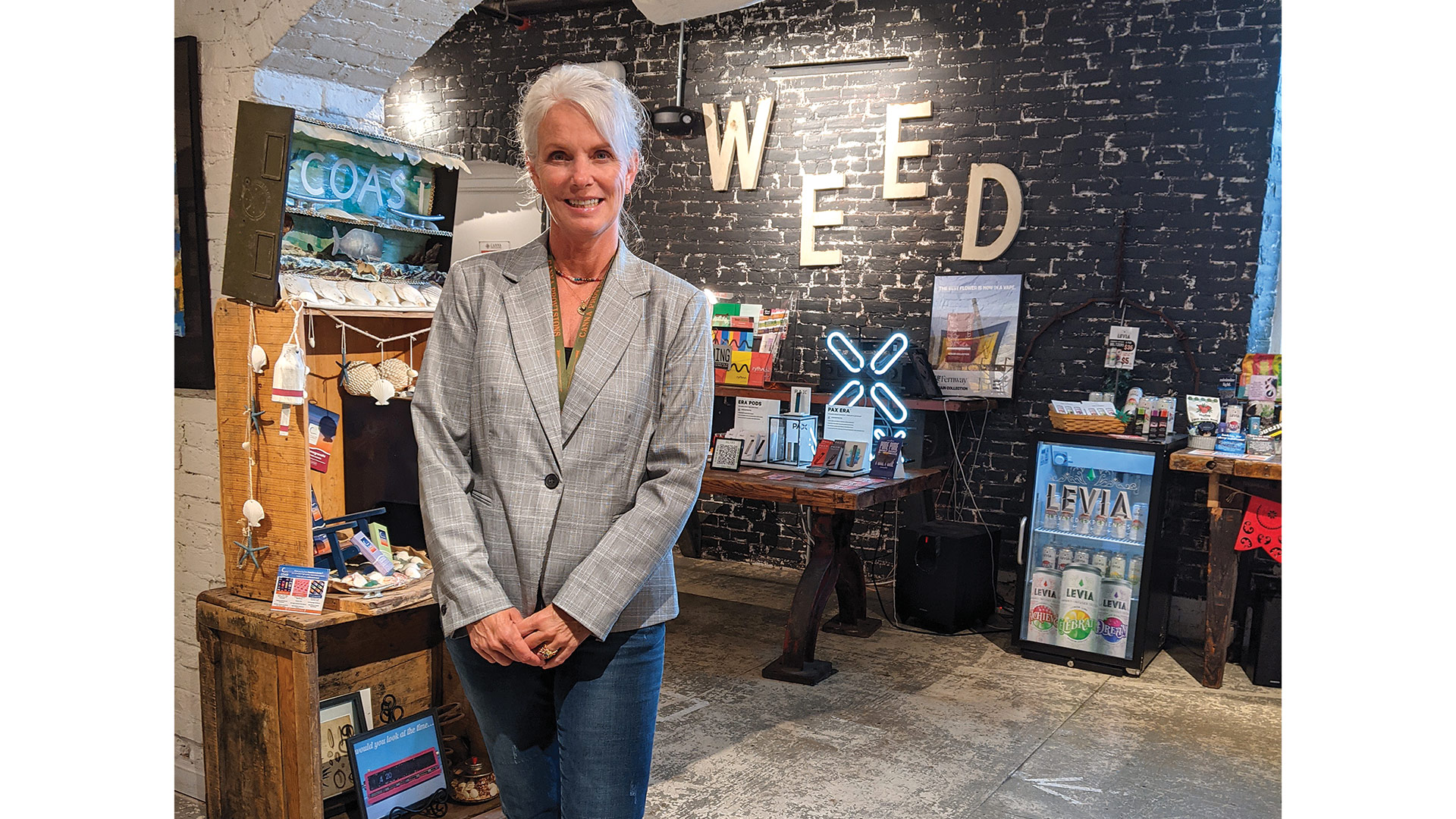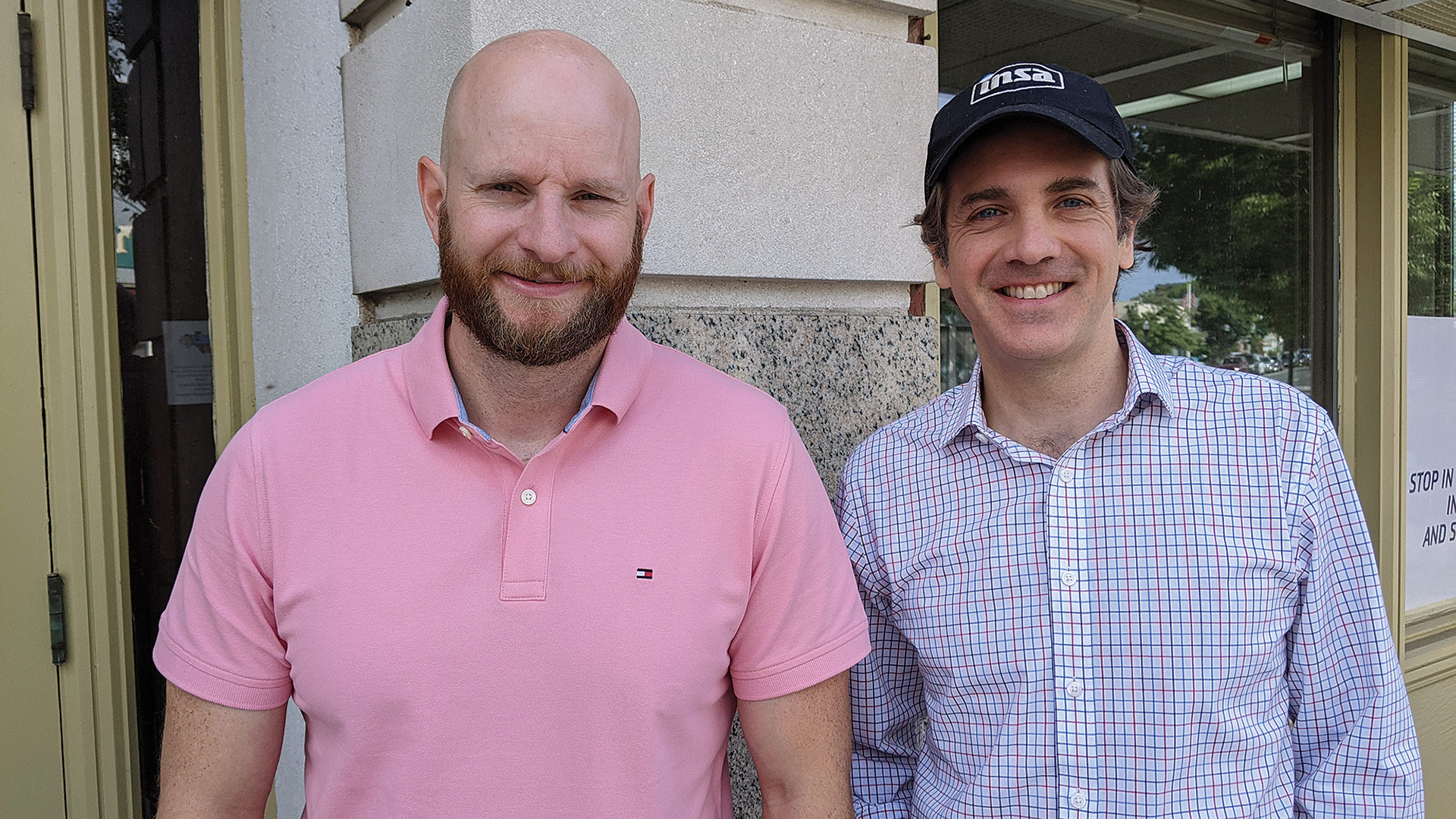
Cannabis Industry Grapples with Many Federal and State Challenges
Growing Concerns

Meg Sanders says the state’s onerous regulatory hurdles have made the cannabis space an unfair playing field, especially for smaller shops and social-equity applicants.
Everyone has seen the dispensaries and other cannabis businesses sprouting up in communities across Massachusetts — and the long lines of customers often stretching out the door. And they might think this business is easy money. But that’s far from the truth, thanks to an onerous tax situation, the illegal nature of the product on the federal level making it tough to enlist financial and other partners, and the slow march from stigma to acceptance of this still-new industry. All of that, however, could be changing, although it will take federal action to loosen some of those shackles.
Meg Sanders is a cannabis-industry veteran, most notably in Colorado, the nation’s first regulated market for legal cannabis. So she’s no stranger to the growing pains the industry is now dealing with in Massachusetts.
But as a local business owner — as CEO of Canna Provisions in Holyoke and Lee — she’s frustrated by them, too.
“We’re limited on what we can do with advertising, and the amount of product we can sell to a customer at a time,” she said, citing just two examples of regulations set forth by the state’s Cannabis Control Commission (CCC).
“The whole idea was to regulate cannabis like we regulate alcohol, and we’re not doing that. Actually, they’re going way above and way over the top, and I don’t think that’s helpful to the industry. I don’t think it’s helpful to individual businesses, and it’s definitely, in my opinion, not in the spirit of the CCC, which is supposed to promote social-equity and economic-empowerment applicants. But the bar for entry is really high, and the bar to stay out of trouble with the CCC is really high.”
“The whole idea was to regulate cannabis like we regulate alcohol, and we’re not doing that. Actually, they’re going way above and way over the top, and I don’t think that’s helpful to the industry.”
In other words, despite the number of cannabis businesses currently operating across Massachusetts — 267 and rising every week — this is a tough field to enter and a tougher one to succeed at, Sanders told BusinessWest.
“I think of people who are bootstrapping, mom-and-pop stores, teams that are working with a limited amount of cash, and it’s not a level playing field,” she went on. “And a lot of things we worry about in this industry are things that really do not matter. The amount of money this industry spends on packaging alone, that just goes in a landfill, is awful, and it’s driven by these rules and regs — it has to be childproof, it’s got to have 57 warning labels on it. I feel ethically horrible about the mounds of packaging in landfills. And the burden it puts on mom-and-pop manufacturers who are trying to make a really cool chocolate bar and the expense that’s going into that packaging … it’s really tricky.”
It doesn’t help, she added, that many state regulations can be challenging to interpret, mainly because the CCC is going through the same growing pains businesses are.

Scott Foster says federal decriminalization of cannabis has gained momentum, but the timeline is still uncertain.
“I’ve seen this in other states — the agency tasked with regulating and monitoring the industry has a very steep learning curve,” Sanders said. “One investigator will tell you one thing, and another investigator will tell you another thing. So they’re not always on the same page for specific rules.”
Many of those regulations address diversion of product, she noted. “We’ve spent millions of dollars building this business. The last thing we’re going to do is flush it down the toilet trying to sneak a pound out the back door. It’s just absurd.”
So are onerous background checks to get into the industry, keeping out some of the individuals — from communities that have been inordinately affected by the Drug War — who should be able to enter and prosper, she added. “Regulators and business owners should be partners to build a better business and correct things that need correcting, understanding everyone is doing their best.”
Those challenges are strictly state-level, but others on the federal level are just as burdensome, and boil down to the fact that the U.S. government still classifies cannabis as an illegal controlled substance. That means most banks and credit unions have avoided doing business with cannabis operators, though that’s slowly changing.
“In the early days, there weren’t a lot of professionals willing to take the career risk to enter the industry, so it was hard to find talent to come in and help grow the business. But, again, you’re starting to see that shift as more states legalize and you see the social proofs play out.”
“The federal illegality is a big challenge, and it doesn’t stop with the banking issue,” said Patrick Gottschlicht, chief operating officer of Insa. “That’s been extremely detrimental to us, but that carries across to other companies that we can work with — payroll processors, ERP [enterprise resource planning] companies, any big national or international software companies, accounting firms, security vendors … they can’t work with us because of that federal illegality.”
That has started to shift as more professional services and banks are opening up to this industry, though many still won’t, and many that do are startups themselves, with less at stake, said Peter Gallagher, Insa’s CEO.
“There’s no playbook for this industry,” he added. “There’s been a lot of trial and error to get to where we are. In the early days, there weren’t a lot of professionals willing to take the career risk to enter the industry, so it was hard to find talent to come in and help grow the business. But, again, you’re starting to see that shift as more states legalize and you see the social proofs play out. People’s friends are getting into it, talking positively about it, and they see the success of the industry, and you’re seeing more willingness to work with cannabis.”
Some bills have been introduced in Washington to, if not legalize cannabis, at least decriminalize it.
“Those bills would make it easier for us, and also de-risk the industry around the margins for a lot of partners,” Gallagher said. “The trend is definitely there, but in what time frame will that happen? From our perspective, it’s been happening a lot faster than we ever expected. When we got into this, we thought the legal conversation would take 20 or 30 years to play out.”
Taking No Credit
Sanders is hopeful, too. “At the federal level, we have big challenges. We can’t even take credit cards. That’s so silly. We can take a debit card and cash, and that’s it. That alone would be a really big help.”
Scott Foster, a partner at Bulkley Richardson and one of the attorneys in that firm’s cannabis practice group, believes sentiment is growing that Congress will act sooner rather than later on some degree of allowing banks into the cannabis space or remove the threat of federal enforcement against entities that partner with cannabis operators.
“That will help create some stability. And the biggest thing it’ll do is allow people to use credit cards at the facilities; it’s largely cash right now. If Congress changes that law, boom — you can use your Visa card, you can use your Mastercard. And the reason that you can’t now is not because Visa and Mastercard have a particular ethical or moral problem with it — they’ve just got a legal problem.”

Patrick Gottschlicht (left) and Peter Gallagher say cannabis is a much more challenging business than it seems — but it’s a rewarding one.
Some federal bills have bipartisan support, he added, “but Congress has a lot of other things going on.” Still, with almost 40 states and territories having legalized medical cannabis and more than 20 giving the OK to adult-use cannabis, “I think the tide is definitely turning on this; it’s just a matter of how far it goes, and how quickly.”
Even without a change in the law, Foster explained, “the banking situation is getting better. We’re seeing some banks and some credit unions more willing to lend into the cannabis space now — much more than a couple years ago. They’re becoming more comfortable with lending for real-estate purposes — not for buying things, necessarily, but for buildout and for creating a space, including cultivation spaces. So that’s a change. A very small change, but the fact that it’s happening at all is a big deal.”
The other federal law cannabis operators want to see changed is Internal Revenue Code Section 280E, which severely limits tax deductions for business that deal in controlled substances prohibited by federal law. In short, businesses can deduct the cost of goods sold, but are not allowed any other deductions or credits on their return, including for wages.
“The taxes are crushing — you can’t deduct wages, rent, or other ordinary deductions. Most of these companies are looking at an effective tax rate of 70% to 90% in that, of their profit at the end of the day, 70% of it goes to pay federal taxes.”
“The taxes are crushing — you can’t deduct wages, rent, or other ordinary deductions,” Foster said. “Most of these companies are looking at an effective tax rate of 70% to 90% in that, of their profit at the end of the day, 70% of it goes to pay federal taxes. And this is after they pay state and local taxes. So the federal government is making a lot of tax money off of cannabis companies across the U.S.
“It’s been challenged multiple times in multiple states,” he went on, “and every tax court and every appellate court has said, ‘Congress can change it, but they were unequivocal in what they said.’ It’s a completely constitutionally valid statute.”
Decriminalizing cannabis federally would neuter the impact of 280E on the industry, which would be massive news for cannabis businesses that are already paying higher-than-average state taxes, while their host communities get a cut of between 3% and 6% as well.
But decriminalization would open many other doors as well, like broadening the market for insuring these businesses.
“There’s a risk that your insurance company could, almost at any point, say, ‘well, what you’re doing is a violation of federal law; therefore, we’re not going to insure you,’” Foster said. “The companies are getting insurance — they’re required to get insurance by the CCC — but they’re not the traditional companies; they’re not the Allstates or the companies you see advertising. They’re smaller, specialty, boutique insurance companies that have figured out it’s worth the risk to them to get into that space because the premiums are appreciably higher than they would be for a comparable business.”
So, again, the lack of federal legislation to decriminalize cannabis is increasing the cost of doing business, he went on. “If that happened, I think the cost of insurance would go down because you’d have more competition overnight in the space.”
Another barrier to continued growth that is slowly coming down is stigma surrounding the products themselves.
“For decades, it was drilled into people’s heads that this was a bad thing,” Gallagher said. “It’s going to take time to change that, and the most powerful tool is social proof and people seeing their friends and relatives using it to either treat various ailments or enhance their lifestyle; they see they’re successful, healthy individuals, and this is just a way to improve their lives. But I think it’s going to take time.”
For example, Gottschlicht added, “we have a bedtime edible to help you sleep, and we’ve seen people who were non-cannabis users start using that and come into the space because of that. It’s incredible how many people have gotten off standard pharmaceuticals and gone to half a gummy every night. The feedback has been, ‘it doesn’t make me groggy; it doesn’t give me the melatonin hangover I’ve gotten in the past. I feel normal in the morning, and it helps me sleep through the night.’”
Hearing those testimonies from friends and family is often how the stigma barrier falls for people who have been nervous about stopping by, he noted. “They think, ‘hey, there’s some good benefit to this.’ Or as an alternative to opioids after surgery — we’ve had a lot of people come in who just don’t want to take opioids for pain after surgery; they want to try cannabis because it’s not as addictive as some of the opioids out there.”
Sanders agreed. “I personally think the biggest move you can make to convert non-cannabis users to cannabis is this one-on-one experience, people telling people, or people coming in and finding relief from something — maybe sleep issues or aches and pains. And when you convert one person, they tell someone, and then they tell someone.”
Business Is Blooming
It’s been fulfilling to see the industry grow, Foster said — not to mention a boost to his own professional practice.
“The big uncertainty now is what consolidation in this industry is going to look like, and when is it going to happen. Everyone knows big players are going to come in and buy up companies and create brands that stretch across the nation; it’s already occurring, though not a lot … yet.”
But as more investors become comfortable with industry — there’s that idea of breaking through stigma again — that consolidation will happen, he went on. Drawing on the beer industry, he noted there’s no Anheuser-Busch in cannabis yet — it’s all microbreweries, so to speak. But even when large, national companies spread across the space, there will always be room for the boutique experience, for small companies that continue to research and promote the effects of new and different strains.
Research that is not currently happening to the degree it could because much research, especially clinical research at universities, is dependent on … wait for it … federal funding.
But once that research takes off and the cannabis industry escapes the shackles of federal illegality — a development that industry players generally agree will happen at some point — the products will continue to become more legitimized in the public eye, and the potential customer base will expand.
“People are asking, is the industry tapped out? No, I’m not seeing that,” Foster said. “Every business that opens up has a line out the door, and every facility that opens up can sell everything it makes. So, we have not reached a point of saturation by any means.”
That ever-expanding competition is another challenge, Sanders said, but one that should benefit all players because it further legitimizes the products in more people’s minds. But it also means individual businesses need to work harder to stand out. Canna does that with a strong focus on the individual experience and locally sourced products — including its own brand, Smash — with interesting, local stories behind them.
“There’s more good people than not in this space, and we owe it to consumers who are cannabis-curious to put our best foot forward and make sure they have as much information about our products as possible, so they don’t have any unexpected reactions,” she said. “Our commitment is to great products we can tell a story about, that we understand and respect and can get behind and provide the best experience we can possibly provide, and educate our customers.”
Insa, which has a production facility in Easthampton and four dispensaries across the region, including a flagship store in Springfield, has also expanded nationally, with a production facility in Pennsylvania selling to about 100 dispensaries and a Florida license to build a production site and medical dispensaries. And Gallagher embraces the growing competition in all those regions.
“The way we look at it, this is a much bigger industry than exists today,” he said. “If we all do a good job and operate responsibly and create good quality products, it will encourage more people to enter the industry and experiment and try it, and this will get much, much bigger. A rising tide lifts all boats, and as long as you have good, responsible players in the market, it’s going to be a benefit to everyone.”
Still, he added, “it’s a tough business. One of the common misperceptions is, people think it’s going to be easy. But it’s probably the hardest thing I’ve had to do. You have to be on it every day. And when you’re dealing with any biological product, the number of variables to control are immense. So it’s extremely challenging.
“But it’s been great,” he added. “The relationships we’ve built along the way have been fantastic. I wouldn’t change it for anything.”
Except, of course, for some pesky federal laws.
Joseph Bednar can be reached at [email protected]





